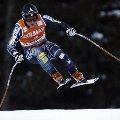Rookie US Skier Aims for Olympic Glory
Andrew Weibrecht grew up in a great place to learn skiing. Weibrecht was born six years after the 1980 Lake Placid games in New York. But the spirit of those Olympics always remained close as he developed early skills at the demanding Whiteface Mountain venue.
"Whiteface is super steep. And it has ever-changing conditions," he said. "So I kind of learned to ski a little bit of everything. And to really figure out how to make it down the ski pitches and control myself. That has shown through to be my definite strength." Starting out as a technical skier, Whiteface also gave Weibrecht the chance to gradually increase his speed. The mountain boasts the steepest vertical drop of any course in the eastern United States. And that helped instill a confidence Weibrecht needs to conquer some of the best slopes in the world.
"Even on the tamest of courses, you are still going about 80 miles an hour [128 km/h] probably. And bad things can happen really quickly," he said. "That is kind of the coolest thing for me, standing in the start, always being nervous. And then feeling that sort of sense of calm that comes as soon as you push out of the gate." That calm was not easy to develop. Weibrecht was the fourth of five children in his home, and he had to be very vocal when he wanted to tag along with his older siblings as they went off to ski.
That youthful energy has remained, prompting U.S. teammates to create nicknames using his last name. He is sometimes called "Warbrecht," "War Horse," and "Wild Man" because of his attacking style and numerous crashes. Weibrecht stands at one meter, 67 centimeters. Despite the crashes, he says he has more stability than most of his colleagues because he is shorter.
"It gives me a sort of an advantage. I have a lower profile against the wind. And my center of gravity is a little bit lower," he said. "I feel like sometimes it is a little more difficult to knock me down. I am sometimes able to see a different line than other people. Which once the courses get beat up, that can be advantageous." The advantage helped Andrew Weibrecht make the U.S. Development Team in 2003. He was named to the lower level "C Team" in 2005. He also raced at the 2004, 2005 and 2006 Junior World Cups, winning a super G bronze medal in 2006. His first full World Cup that year was not as good. He was disqualified in the downhill portion of the super combined event.
Even in 2009 at the world championships, Weibrecht did not finish in the downhill, super combined, and finished 39th in the super G. His physical build and style is similar to Didier Cuche. And the Swiss veteran has noticed, even giving some advice to the young American, says Weibrecht.
"Last year, he chastised me a little bit for taking so much risk and just never really thinking about what I was doing," he said. "I actually got stuck in a gondola with him. And he was telling me about his experience and how he spent maybe the first five or six years of his career just crashing into fences and blowing up until he finally figured out how to make it all work." The first glimmer of his potential came in 2007 at the challenging Birds of Prey downhill in Beaver Creek, Colorado.
Skiing in just his seventh-career World Cup race, Weibrecht pulled off one of the most exhilarating Alpine runs in recent memory. He sliced through the treacherous Golden Eagle and Abyss sections that had doomed many others in a driving blizzard. Weibrecht's 10th-place finish was a mere 0.54 seconds behind the winner, Michael Walchhofer of Austria. The race remains his best World Cup result to date.
Weibrecht finally gained consistent results last year on the men's speed team. He scored top 15 results in both downhill and super G in nearly every start en route to making his first U.S. Olympic Team. Weibrecht credits his success to good coaching, and he has received a few other pointers regarding the Vancouver Games.
"I am one of the few new guys," he said. "I definitely have been able to get a sort of perspective of what to expect and what to look out for in terms of managing the added pressure and different situations that are above and beyond something that I have ever encountered." When not on the slopes, Weibrecht takes classes at Dartmouth College and plans on eventually earning his Bachelor of Arts in earth science. But there is little science before he races. Like many athletes, Weibrecht has a set of superstitious routines. He always puts his right ski boot on first, he touches his helmet and goggles two dozen times before leaving the start house.
Spectators at the Vancouver Games may see Weibrecht add one more gesture - holding an Olympic medal in the air.

